This article was co-authored by Luba Lee, FNP-BC, MS. Luba Lee, FNP-BC is a Board-Certified Family Nurse Practitioner (FNP) and educator in Tennessee with over a decade of clinical experience. Luba has certifications in Pediatric Advanced Life Support (PALS), Emergency Medicine, Advanced Cardiac Life Support (ACLS), Team Building, and Critical Care Nursing. She received her Master of Science in Nursing (MSN) from the University of Tennessee in 2006.
There are 7 references cited in this article, which can be found at the bottom of the page.
wikiHow marks an article as reader-approved once it receives enough positive feedback. In this case, 91% of readers who voted found the article helpful, earning it our reader-approved status.
This article has been viewed 185,408 times.
The Hoyer Lift is a mechanical device designed to lift patients safely. Although Hoyer is a brand name, it is often used as a generic term to refer to any type of mechanical patient lift. Most patient lifts work in a similar fashion, but there are many models, and you should check with the owner's manual, manufacturer, or expert user to see if yours has unusual features. Always familiarize yourself with the lift and practice with empty slings and fully mobile volunteers before transferring paraplegics, surgical patients, and other users with limited mobility.
Steps
Familiarizing Yourself with the Lift and Sling
-
1Identify the base, legs, and wheels. The lift should have 2 "legs" parallel to the floor, supported by 4 wheels. These need to be stable at all times, so make sure the wheels are tightly attached and do not use the Hoyer lift on uneven floors.
-
2Move the legs of the lift apart with the spreader handle. A vertical spreader handle (or shifter handle) next to the main column of the lift can be pulled to move the legs further apart or bring them back together. The handle should lock into a slot to keep the legs from moving once they reach the proper position.
- Some models may have a foot pedal instead of a spreader handle.
- Always lock the legs to their widest position before lifting a patient, and as long as the patient remains in the lift. Failing to do so could cause the lift to fall over.
Advertisement -
3Note the boom and sling bars. At the top of the Hoyer lift is a long, angled bar called the boom. At the end of this boom hangs a 4-pronged sling bar, also known as a swivel bar. This has 4 or more hooks for attaching the sling that will hold the patient.
-
4Find out how to raise and lower the boom. There are 2 types of Hoyer lifts: manual (or hydraulic) and powered (or electric). The only difference between these types of lifts is the method used to raise or lower the boom. Manual lifts have a pump handle which must be moved up and down repeatedly to raise the boom, whereas battery-powered lifts have simple "Up" and "Down" arrows to control the boom.[1]
- Find the small control valve at the base of a manual lift's pump handle. When the control valve is positioned toward the pump handle, the valve is closed. The valve must be in this position in order for the pump to work when elevating the boom. Keep pumping until the boom locks into place.[2]
- When the control valve is positioned away from the pump handle, the valve is open. Gently move the control valve from the closed to the open position to control the rate at which the boom lowers.
- Experiment with raising and lowering the boom before you put the patient in the lift. It’s important to thoroughly familiarize yourself with how the lift works before using it to move a patient.
-
5Look for an emergency release on electric lifts. In case of power failure, most electric patient lifts have an emergency release control, which mechanically lowers the patient. Know where this is located and how to operate it. Some models have an inset button which requires a pen to reach, but you should check your lift's manual for specifics.
- Manual lifts do not have an emergency release, since the lift is controlled by human power rather than a battery with a limited lifespan.
- There may be 2 or more emergency releases on your model. Know which is the primary release, and which should only be attempted if the first fails.
-
6Identify your type of sling. U-slings are the easiest and quickest to use, and are appropriate for users that can sit up, even slightly. Lifting with a full body sling, or hammock sling, takes more time but is required for users that cannot sit up on their own.[3]
- U-slings are shaped roughly like the letter U, with 2 long extensions running parallel to each other. They are often padded for greater comfort.
- A full body or hammock sling is 1 large piece, sometimes with a commode hole.
- Use a sling that provides head and neck support for users who cannot support their own neck.
- Make sure the sling you use is appropriate to your model of lift. Contact the manufacturer to ask if necessary.
- Use the advice of a physician to select a sling that is the right size and type for each user, and make it their personal sling. Slings come in small, medium, and large sizes. Familiarize yourself with the dimensions of the different sizes so that you can pick the right one for your patient.
-
7Check the sling for defects. Tears, loose stitching, or worn loops could cause the sling to break mid-transfer, possibly injuring yourself or the user. These slings are sturdy, but you should check before each transfer just in case the sling needs to be replaced.[4]
-
8Learn how to attach the sling to the sling hooks. Different slings come with a variety of ways to attach them to the sling hooks of the lift, including chains, straps, and loops. Familiarize yourself with these attachment points, using the owner's manual or an experienced user to guide you.
- If using a sling with hooks, attach them so the open side of the hook points away from the user, to prevent injury.[5]
- Understand which side of the sling the patient should sit on, and which is the outside. Consult an expert or the manufacturer if unsure.
-
9Practice good lifting technique. The Hoyer lift does most of the work for you, but you will still need to move the user in and out of the sling. You should follow safe lifting practices to minimize risk of injury. All the tips that apply to lifting furniture or other heavy objects apply here as well.
- Use your legs to provide strength and stability. Place them apart and bend at the knees before lifting.
- Keep your back as straight as possible while lifting.
- Do not twist your body as you lift. Position yourself directly in front of where the patient is going so you do not need to rotate your torso halfway through lifting.
-
10Practice each type of transfer thoroughly before performing one on a user. Follow these instructions several times using an empty Hoyer lift, then practice on a volunteer who has full mobility. Be familiar with each step before you try to perform a transfer on the intended user, especially alone.
- If possible, perform your transfers with an assistant who also knows how to operate the lift. Many hospitals require 2 people to operate the lift even if they are experienced operators, to reduce the chance of injury.
- Even when you’re using a Hoyer lift correctly, there’s a chance you could injure yourself or your patient if you try to do a lift by yourself. Get another person to help you if at all possible, even if you’re using the lift in a home rather than a hospital setting.
- Risks of doing a lift by yourself include the patient slipping out of the slings, the weight of the patient causing the lift to tilt, or injury to your back.
-
11Know the limits of your lift and sling. Consult the owner's manual or contact the manufacturer to find out how much weight your model of lift and sling can support. Never attempt to lift a user too heavy for the lift or sling. Always use the correct sling for the user's needs.
- Ask about a new user's mobility before lifting so you know how much they can contribute to the movement. For example, find out if they are able to sit up on their own or hold onto the sling.
- Use your best judgement when asked to lift a user who makes sudden involuntary movements, has a hostile attitude, or could otherwise cause injury to one or both of you. Refuse if necessary rather than endangering yourself and the user. Don’t try to lift someone who is arguing or physically resisting you.
Transferring Someone from a Horizontal Position
-
1Explain each step of the procedure to the user. Explain to the user what you are going to do before each action, and why you are doing it. Let them know the reason for the transfer if they did not request it, and involve them in every step of the process. Besides showing them respect, this will let them aid you in the process when they are able.
-
2Keep the guard rails up and locked whenever possible if using a hospital bed. The rails should be up as long as they don't interfere with your access. You will need to move from one side of the bed to the other several times if you do not have an assistant, but make sure to raise and lock the guard rail each time before leaving a side. It's fine to temporarily lower the rail if it gives you better access to the user when assisting them into the sling.
- You will need to position the slings under the patient at the top and bottom before attaching them to the lift. Make sure the slings are correctly positioned and even on both sides before attaching them.
- Once the sling is attached to the Hoyer lift, raise and lock the guard rails again before lifting. The user may wish to hold onto the guard rails for stability as the lifting begins.
- Try a slight lift off the bed to make sure everything is positioned correctly before you move the Hoyer lift.
-
3Raise the bed to maximum flat height if possible. If you are using a bed that can elevate while remaining flat, elevate it to the maximum height you can comfortably work on. The higher it is, the less strain will be put on your back when you assist the user.
-
4Have the user lie on their back near the side you will be placing the lift. For single and twin beds, they should lie in the center. If they are on a queen bed or other large bed, they should lie nearer the side you will transfer them from.
- The user should not be on the extreme edge of the bed.
-
5Remove any excess blankets or sheets from the top of the patient. Place any objects that could get in the way of the transfer on another surface or near the base of the bed. Straighten the patient's clothing or gown.
- If the patient feels exposed (e.g., if they are undressed and preparing to go to the shower), leave just a sheet in place to provide some privacy.
-
6Have the user raise the leg nearest you. Raise the knee next to you and place the user's foot flat on the bed. Tell them that you will be rolling them onto one side and the raised knee will make it easier.
-
7Roll the user onto the side opposite you. Gently hold the raised knee and the opposite shoulder of the user, then carefully push them onto their side, facing away from you.[6]
- If the user cannot stay on their side without support, place a rolled-up towel or similar soft object behind their back to wedge them in place. Alternatively, have an assistant gently hold them in place.
-
8Fold the sling in half lengthwise and place it next to the user. The bottom end should be just above the user's knees and the top end should be just above the user's armpits.[7] Make sure that the loops and tabs are on the inside when you fold.
- Make sure the fold of the sling is next to the user, with the open side facing away from them.
- You can fold the sling, roll it onto the person’s back, or just gently push it into place.
-
9Roll the user onto their back and then onto their other side. Using the same rolling techniques, roll the user over until they are on their other side, on top of the folded sling.
- Move to the other side of the bed if you can't comfortably roll the user from the same side.
- If using a wedge, remove it before rolling the user onto their back to avoid discomfort.
-
10Tug gently at the top layer of the folded sling. Pull the sling out to unfold it, so that it lies flat across the bed. Take care not to position the top of the sling too close to the patient’s underarms or breasts, especially if they are heavy-breasted.
-
11Roll the user onto their back, over the sling. Arrange the user's limbs according to the construction of the sling and the user's preferences. The arms should either be straight and flat next to the body, or extended out of the way of the sling if the user wishes to place their arms outside the sling. The legs should be flat, and either together or slightly apart, according to the design of the sling.
-
12Lock the lift into position under the user's bed. Check under the bed for obstructions if the lift won't fit. If you need to, narrow the legs using the shifter handle or foot pedal, but always extend them as much as you can once they are under the bed.
- The sling bar should be above and parallel to the patient's shoulders.
- Always lock the wheels of the lift before continuing.
-
13Lower the boom until the sling bar is over the patient. Lower it enough that the sling loops will reach the sling hooks, but not so low that it touches the patient.
- If you do not know how to lower the boom, learn how to do so before using the lift with a patient in it. You should always be familiar with the lift before transferring someone with limited mobility.
-
14Hook the loops on the sides of the u-sling to the cradle. There may be multiple loops behind the user's shoulders so you can choose the loop that fits most comfortably. Ask the user for their input if possible. Using straps, chains, or long sling loops, attach each corner of the sling to the correct hook on the sling bar.
- For slings with leg loops, cross the leg loops under the user's legs. Make sure the left loop is reaching across to hook to the right hook, while the right loop is reaching across to hook to the left hook, and that the hooks are set away from the boom of the lift apparatus. This criss-cross helps the user's legs stay together and keeps the user from slipping out of the sling.
- Some slings include a flap that can be hooked up to help support the neck and head. This detachable flap may not be comfortable for those that are capable of head control.
- Keep the open end of hooks facing away from the user to avoid injury.
-
15Raise the boom slowly. Make sure the loops are hooked firmly in place, and raise the boom until the patient lifts a short distance above the bed. Make sure everything is secure and comfortable before proceeding.
- If the lift does not seem secure and comfortable for the patient, slowly lower it, make any necessary adjustments, and start again.
-
16Roll the lift with the sling and user in place slowly to the new destination. Unlock the wheels of the lift and roll them carefully to the destination. You may need to adjust the width of the legs, but do not do so while the boom is being raised or lowered. You should not raise or lower the boom while rolling the lift.
- If you are moving to another room, slowly adjust the swivel bar so the user is facing you as you move the lift.
- Position the user carefully, directly over the center of the new destination (e.g., a chair, a toilet, or another bed).
-
17Lower the boom until the user is positioned comfortably. If transferring to a chair or wheelchair, the user should have their hips as far back as possible.
-
18Unhook the sling loops and remove the sling. Only do so when the user is fully sitting or lying in the new destination. Gently remove the sling out from under the user and put it in a safe space.
- Roll the patient from side to side, and fold and remove the sling if the patient is on a bed or a stretcher. Use the same rolling techniques you used to move the patient onto the slings.
- Tug gently upwards to slide the sling out from behind the patient if the patient is in a wheelchair or a car.
- For example, if you’re moving the patient to a wheelchair, tug upwards on the top sling while gently bending the person into a sitting position. Then, reach behind their back and remove the sling. Then you can gently remove the sling under their legs from below the hip area.
Using a Hoyer Lift from a Sitting Position
-
1Explain what you are doing as you go. Make sure the user knows where they are going, and that you are transferring them into the lift for this purpose. Describe each step so they know what you are doing and can help you to the extent of their ability.
-
2Position the u-sling behind the user. The loops should be facing the front, and the arch of the "u" at the top. The ends of the "u" are going to criss-cross under the legs, so they need to be lowest.
- If you’re transferring someone from a wheelchair, lock the wheels in place first.[8]
-
3Shimmy the slings down behind the user. Pull the slings down between the user's back and the chair with short, tugging motions. Make sure that the end of the fabric makes it down far enough to cover the user's hips.
- If the person is in a wheelchair, pull the straps down to their mid-thighs. Cross the leg straps through one another before bringing in the lift.[9]
-
4Bring the lift apparatus over to the chair and widen the legs. The base moves on casters and becomes wider and thinner at the front below the cradle in order to be able to get closer to the user's position.
- Open or close the front of the base of the lift apparatus as is appropriate in order to get the cradle directly over the user. Use a foot pedal or shifting lever on the back of the base of the lift apparatus to control the width of the legs.
- Always widen the legs as much as possible before lifting.
- Always lock the wheels of the wheelchair in place before lifting. You can also secure the chair against a wall or have an assistant stand behind the chair to stabilize it.
-
5Hook the loops on the sides of the u-sling to the cradle. There may be adjustable loops for behind the user's shoulders so you can work with the user to find the most comfortable fit. Hook these loops to the hooks on the swivel bar at the end of the boom.
- Cross the leg loops under the user's legs unless they’re in a wheelchair. Make sure the left loop is reaching across to hook to the right hook, while the right loop is reaching across to hook to the left hook, and that the hooks won't interfere with the motion of the boom. This criss-cross helps the user's legs stay together and keeps the user from slipping out of the sling. Note that not all lifts have this cross-cross—some are straight across.
- Hook the flap for neck support if the user is not able to hold up their head. This flap should be left unhooked for users who can hold their heads up.
-
6Lift the cradle slowly. Watch to make sure the loops are well secured. Lift until the patient is clear of the chair and check that everything is secure and comfortable before proceeding.
-
7Roll the lift with the sling and user in place slowly to the destination. Unlock the wheels and steer the lift to its new destination. Adjust the width of the wheels if necessary, but only after the boom has been raised to the correct height.
- The user should be facing the mast of the lift.
-
8Lock the wheels in place at their widest position above the new destination. Position the user carefully so they will be comfortable and secure when you lower them into place.
-
9Lower the boom slowly into position. Always do this using the pump lever, for manual lifts, or the electronic controls, for powered lifts. Make sure the user is comfortable, with the hips as far back as possible if the transfer is onto another chair.
-
10Remove the sling once the user is secure. Tug gently upwards to slid out the sling if the user is in a chair. If they are lying down, roll them gently to one side, fold the sling, then roll them to their other side to remove the folded sling.
Expert Q&A
Did you know you can get expert answers for this article?
Unlock expert answers by supporting wikiHow
-
QuestionHow does a person go to the bathroom from a hoyer lift and wipe?
 Jurdy Dugdale, RNJurdy Dugdale is a Registered Nurse in Florida. She received her Nursing License from the Florida Board of Nursing in 1989.
Jurdy Dugdale, RNJurdy Dugdale is a Registered Nurse in Florida. She received her Nursing License from the Florida Board of Nursing in 1989.
Medical Review Board
Warnings
- Make sure all beds, stretchers, wheelchairs and the lift apparatus are locked when you are not moving them from 1 place to another during this process. One of these items moving away from another could cause the patient a potentially dangerous crash.⧼thumbs_response⧽
- Never pull directly on the boom bar to raise or lower it while a patient is in the sling.⧼thumbs_response⧽
Things You'll Need
- Hoyer Lift
- Sling assigned to the patient by a physician
- Appropriate bed, chair, or other destination for receiving the patient.
- Assistant (recommended for greater safety, but not required)
References
- ↑ http://www.phc-online.com/How_to_use_Hoyer-Lift_a/146.htm
- ↑ http://www.invacare.com/doc_files/1078987.pdf
- ↑ http://www.phc-online.com/Hoyer_Sling-Instruction_a/147.htm
- ↑ https://www.youtube.com/watch?feature=player_embedded&v=DinUBHOBlWU
- ↑ http://www.phc-online.com/Hoyer_Sling-Instruction_a/147.htm
- ↑ https://www.youtube.com/watch?feature=player_embedded&v=DinUBHOBlWU
- ↑ https://www.youtube.com/watch?v=Aib_EZFaM_I
- ↑ https://youtu.be/yjSpyldImeI?t=19
- ↑ https://youtu.be/yjSpyldImeI?t=61
About This Article
To use a Hoyer lift to transfer someone from a horizontal position, first you’ll need to position the sling underneath their body, which you can do by rolling them to one side and then the other. Then, lock the lift into position, lower the boom with the sling bar over them, and hook the bar up to the sling. Next, raise the boom slowly while you make sure the person is secure. When everything looks good, roll the lift to the new destination. You can then lower the boom, position the person in their new spot, and unhook and remove the sling. For step-by-step instructions on how to use a Hoyer lift to get someone who’s seated out of their chair, scroll down!
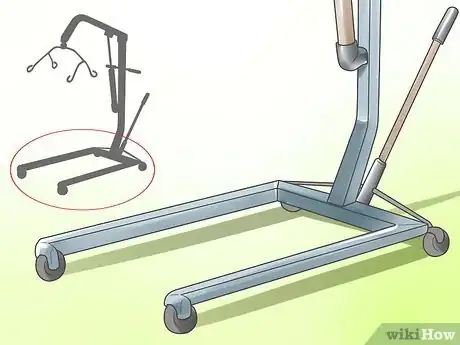
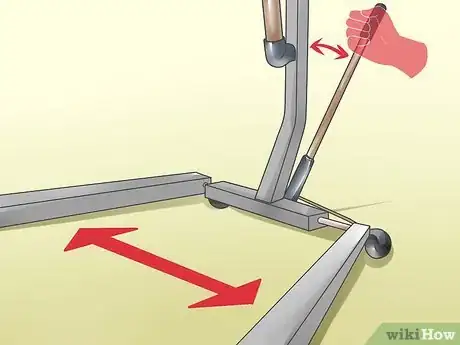

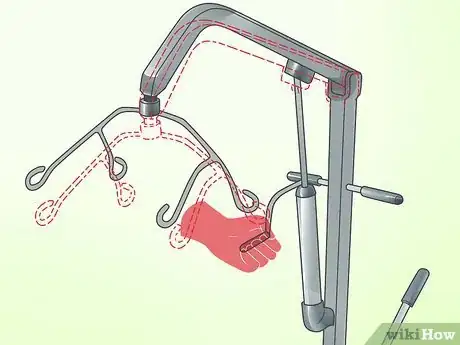
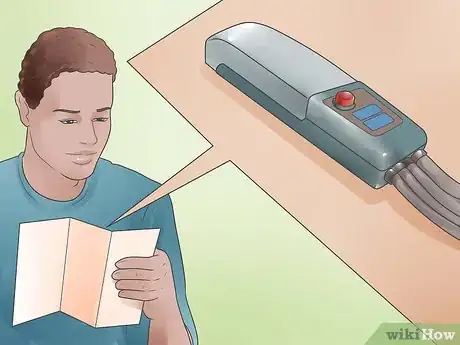
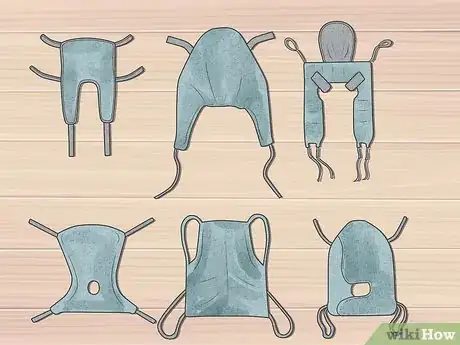
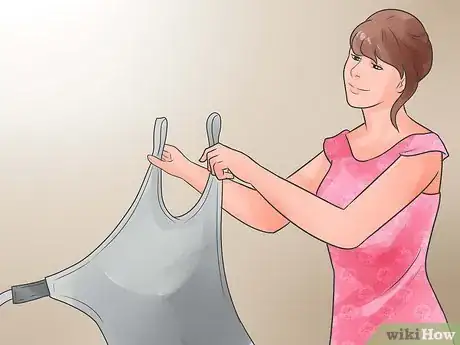
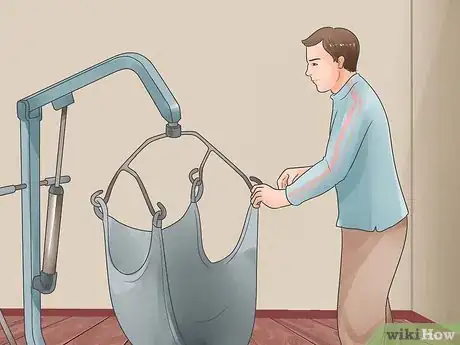
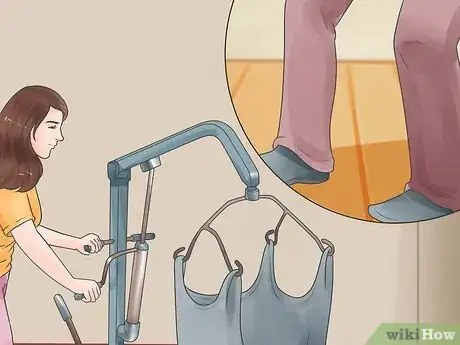
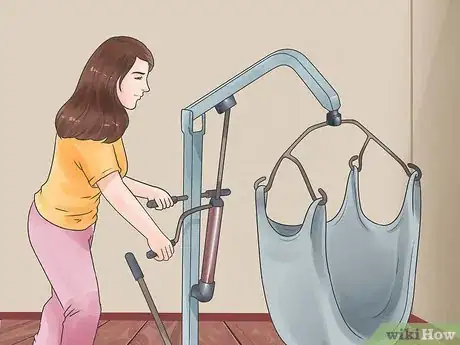

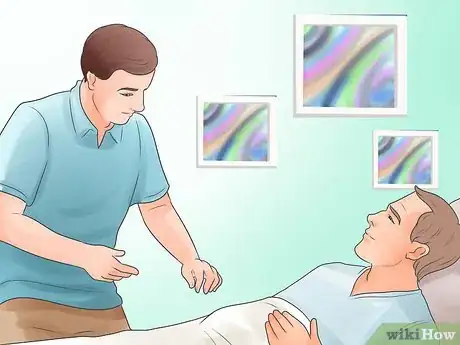
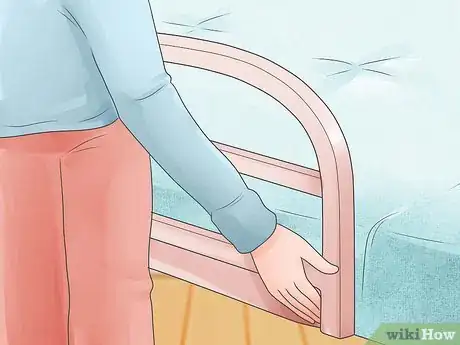
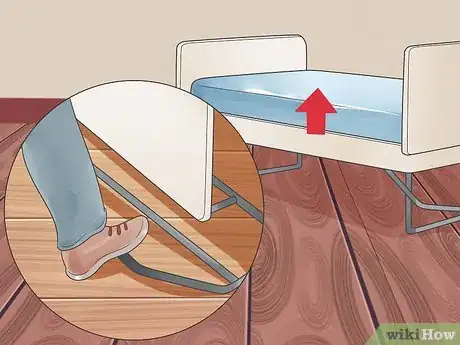
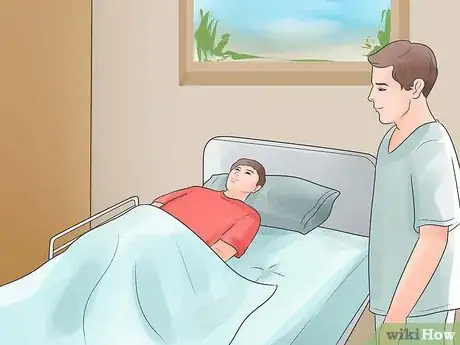
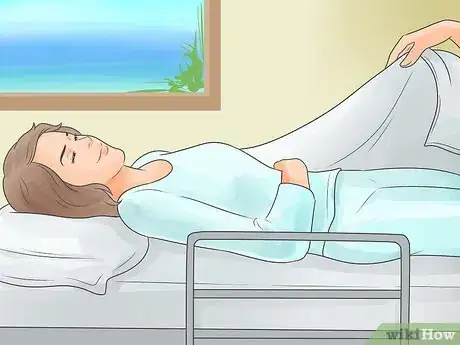
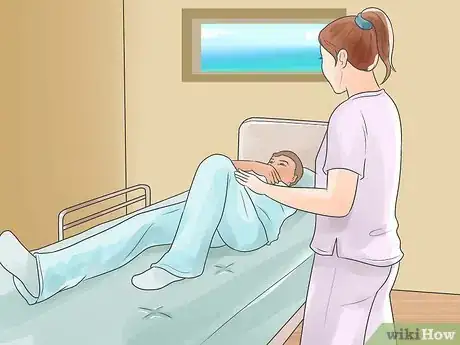
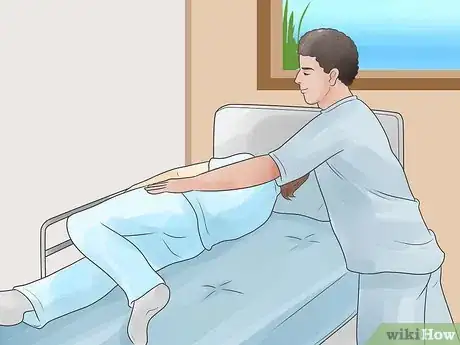
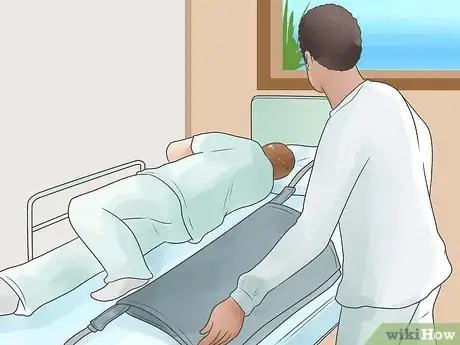
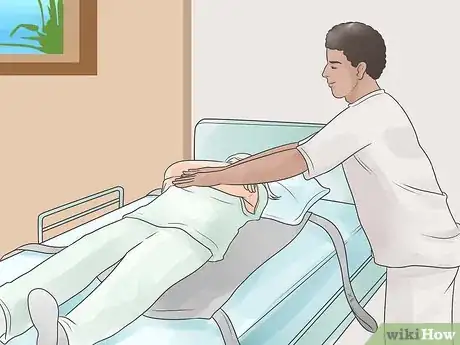
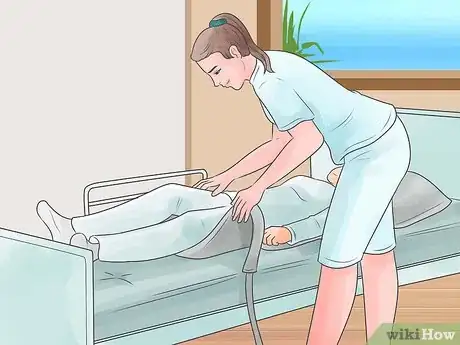
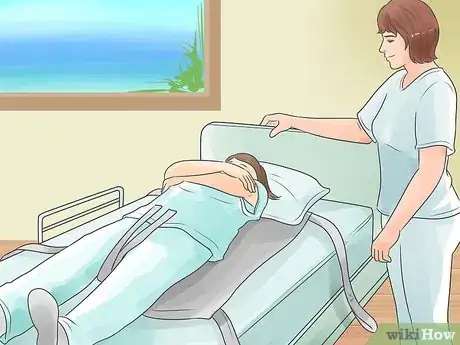
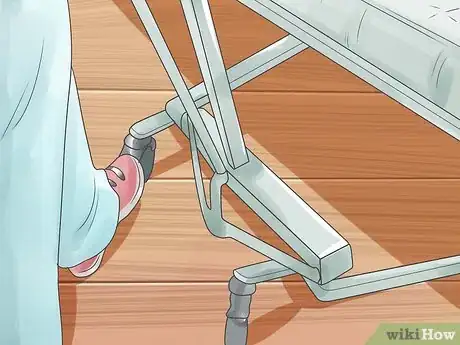
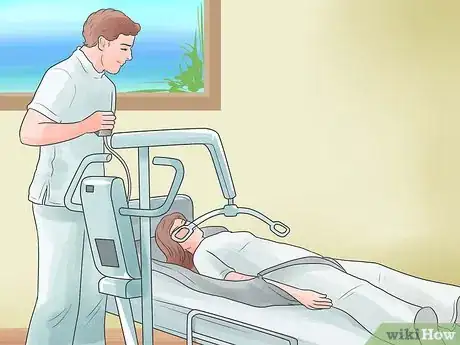
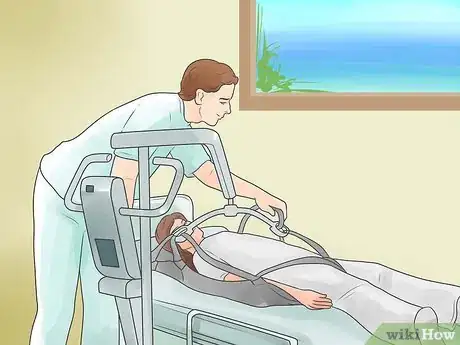
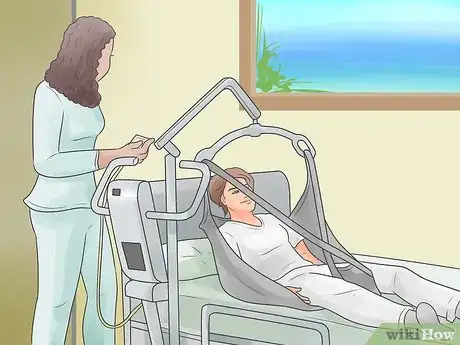
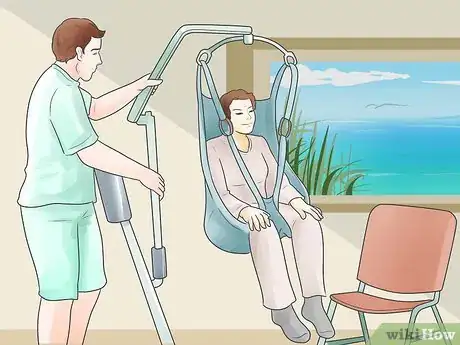
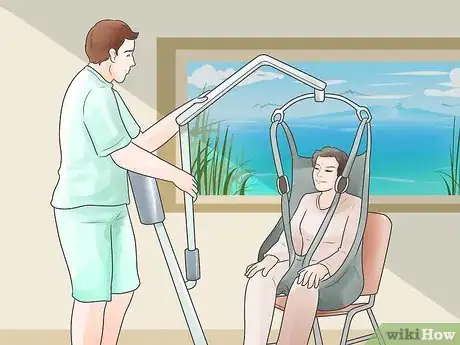
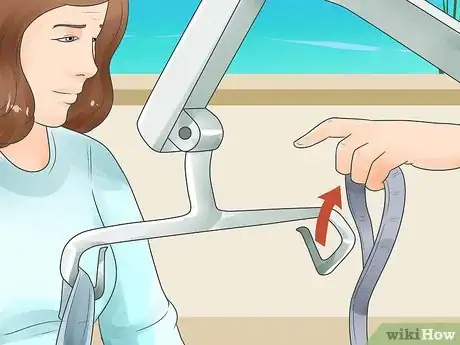
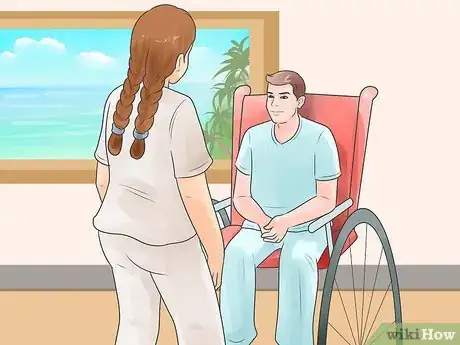
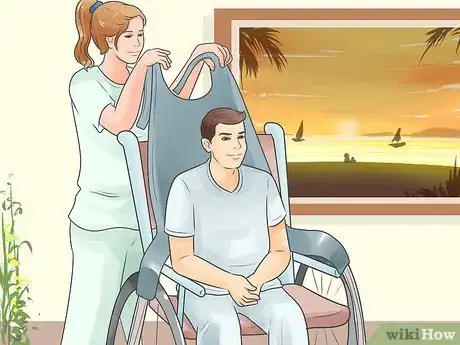
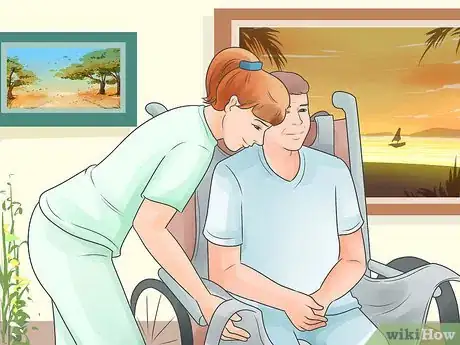
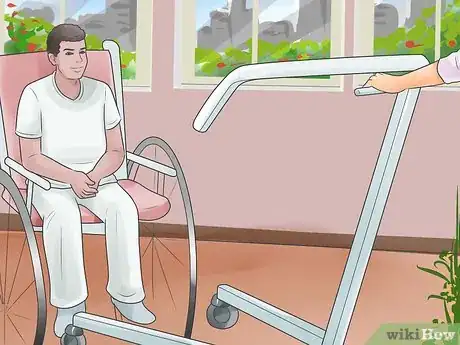
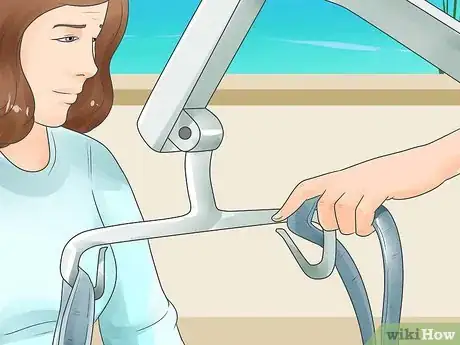
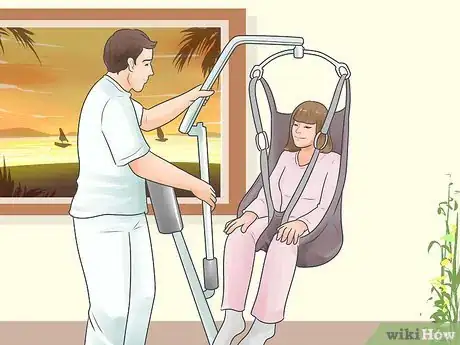
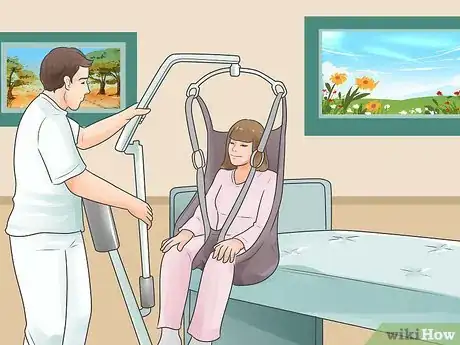
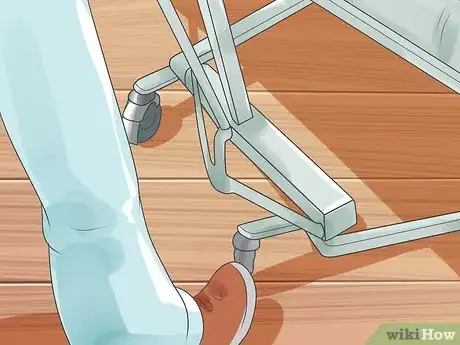
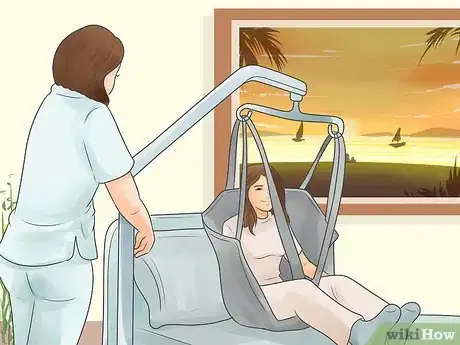
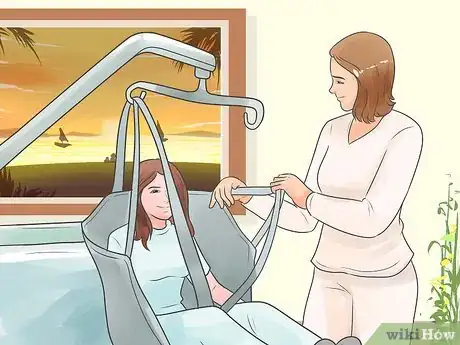


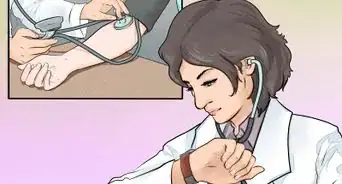



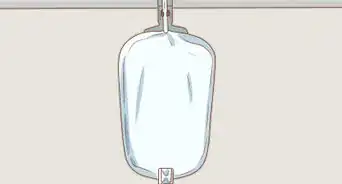



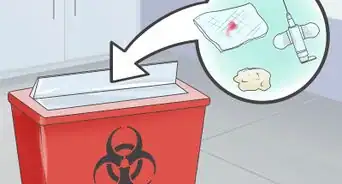









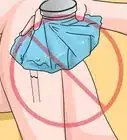
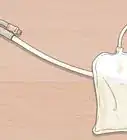
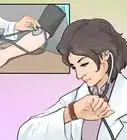




































Medical Disclaimer
The content of this article is not intended to be a substitute for professional medical advice, examination, diagnosis, or treatment. You should always contact your doctor or other qualified healthcare professional before starting, changing, or stopping any kind of health treatment.
Read More...